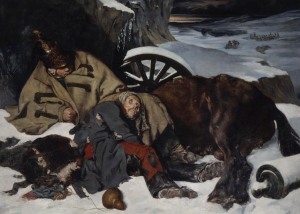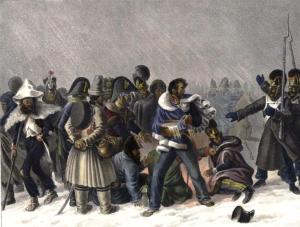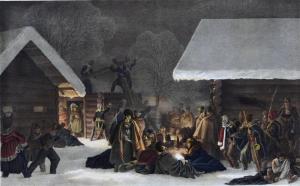When studying the destruction of the Grande Armée in Russia, it is sometimes tempting to look for a single error, a surprisingly minor oversight that if corrected would have made an enormous change in the outcome of the event – What if…
Fellow blogger Alice Shepperson (Noon Observation) tackles the question: Was it really the lack of winter horseshoes that led to the destruction of the Grande Armée on the retreat from Russia? Here’s Alice:

Winter Horseshoes
Note the Four Raised Points
In a recent BBC documentary, Bullets, Boots and Bandages, historian Saul David argued that a major reason for the disastrous nature of the retreat from Moscow was Napoleon’s failure to bring winter horseshoes or frost nails – spikes designed to give horses grip on ice. “This tiny logistical oversight,” argues David, “was to cost him dear.” He backs this up with statements from professional farriers about the effects this would have had on the horses: their shoes gave them no traction on up-hills and no brakes on down-hills. This was certainly a problem. Adolphe Thiers describes the plight

Frost Nails
of the French artillery horses after they left Moscow: “Flogged until they were covered with blood, and their knees torn with frequent falling, they were found incapable of overcoming ordinary obstacles, through loss of strength and want of means to prevent their slipping on the ice.” But was this really the cause of the army’s destruction?

French Horse-Drawn Artillery
It certainly destroyed some of it. Robert Wilson, who had been seconded to the Imperial Russian Army wrote on the November 5th that “some Cossacks … seeing a gun and several tumbrils at the bottom of a ravine, with the horses lying on the ground, dismounted, and taking up the feet of several, hallooed, ran, … danced, and made fantastic gestures like crazy men … they pointed to the horses’ shoes and said— ” God has made Napoleon forget that there was a winter in our country…” It was soon ascertained that all horses of the enemy’s army were in the same improperly-shod state, except those of the Polish corps, and the Emperor’s own.”
But in order to determine the importance of this, we should consider what these horses were actually pulling…
Artillery certainly required horsepower, and guns and ammunition were some of the first things that the army started discarding. Was artillery needed in the retreat? Yes, for defence against the enemy, but there is no particular incident in which the French were crippled by lack of guns or ammo. Cannon could certainly not prevent soldiers dying of hunger or cold, which were the major killers.
Wounded men were another burden, and to his credit, Napoleon tried to cram as many as possible onto the army’s wagons, often much to the annoyance of their drivers. There were also non-military personnel to be carried, such as the artists and musicians Napoleon brought with him, and some of the numerous women, and even children, who followed the army. The loss of wagons would have had a terrible effect on the prospects of the wounded and non-combatants, but these people (though it seems heartless) were not essential to the continued cohesion or existence of the Grand Armée.
Many of the 40,000 or so carts that left Moscow however, were filled with loot and officers’ baggage. Colonel Count Roguet reported that, “for nearly forty miles I had to pick my way through the army’s procession of horse-drawn vehicles. Every one was laden with useless baggage.” The plunder included paintings, chandeliers and entire libraries. All were gradually jettisoned, making a lot of pursuing Cossacks extremely rich, but not destroying the French.
Essentially, having adequate horse-drawn transport only makes a difference to the health and wellbeing of soldiers if there are useful stores to move. By the time the roads became icy in late October, an overabundance of supplies was not really a problem for the French. Captain Roeder said after the battle of Maloyaroslavets, “the whole army was now living almost entirely on horse flesh.” Others speak of foraging cabbage stalks or hempseed from abandoned farms or making soup using tallow (used to lubricate rifles). There were even instances of cannibalism. If there had been food in the carts, the chances are it would have been taken by force by the starving men, as happened when the first units reached the warehouses in Smolensk.
Horsepower did not in fact give out totally. When the Berezina was reached on the 26th November, General Jean Baptiste Eblé still had the crucial forges, charcoal and sapper tools needed to build two trestle bridges, and there was enough artillery to cover the rearguard action and protect the crossing. Even this late in the retreat there were horses and wagons enough to transport these essentials.
So if the demise of horse-powered transport was not to blame for the army’s privations, what was?
The Grande Armée was so ill-prepared for a winter retreat, that horseshoes were just a tiny drop in the ocean of its deficiencies. As well as lacking food and fodder, they lacked winter clothing. Boris Uxkull, a Russian cavalry officer, remarked in his journal on November 12th that among the French prisoners “you see the most peculiar clothes – cuirassiers with feet wrapped up in sheets and rags, cannoneers in women’s clothes and muffs”. Some even blame the disaster on the tin buttons that Napoleon “foolishly” used, which may have turned to dust at around -30°C. Nor did the army have tents, Napoleon believing that, “tents are unfavourable to health. The soldier is best when he bivouacs… A few planks and a morsel of straw shelter him from the wind.” This was all very well in wooded, densely inhabited Europe where other shelter was available, but on the exposed Russian plains, soldiers needed more than a bit of straw to keep warm.

Scott’s Ponies
It’s important to remember that neither men nor horses do well in temperatures below -20°C, whether they’re wearing the right shoes or not. Look what happened to Captain Scott’s ponies exactly 100 years later, though they had been carefully selected from Siberian stock and supplied with the latest snowshoes and goggles. When constant Cossack attacks are added to the harsh conditions, it seems likely that these external factors had a far greater destructive effect than the want of winter horseshoes.

Pony Snowshoes
But isn’t the basic problem that Napoleon never intended to conduct a prolonged campaign through the Russian winter? His mistake, therefore, was to march his army all the way to Moscow, not packing the wrong food, uniforms, buttons or horseshoes.
The nail (tee-hee) in the coffin of the horseshoe theory is that the Russians often didn’t have the right ones either. Uxkull complains on October 24th that “our horses, which have no shoes, slip on the frozen ground and fall down, never to get up again. The artillery especially is suffering a lot.” The difference was that they weren’t a thousand miles into hostile enemy territory beyond the reach of supplies.
Source:
Alice Shepperson, the writer of today’s blog post, is also the writer of her own blog, Noon Observation, a humorous and informative look at various history topics. I highly recommend a visit and signing up to follow her blog.




















